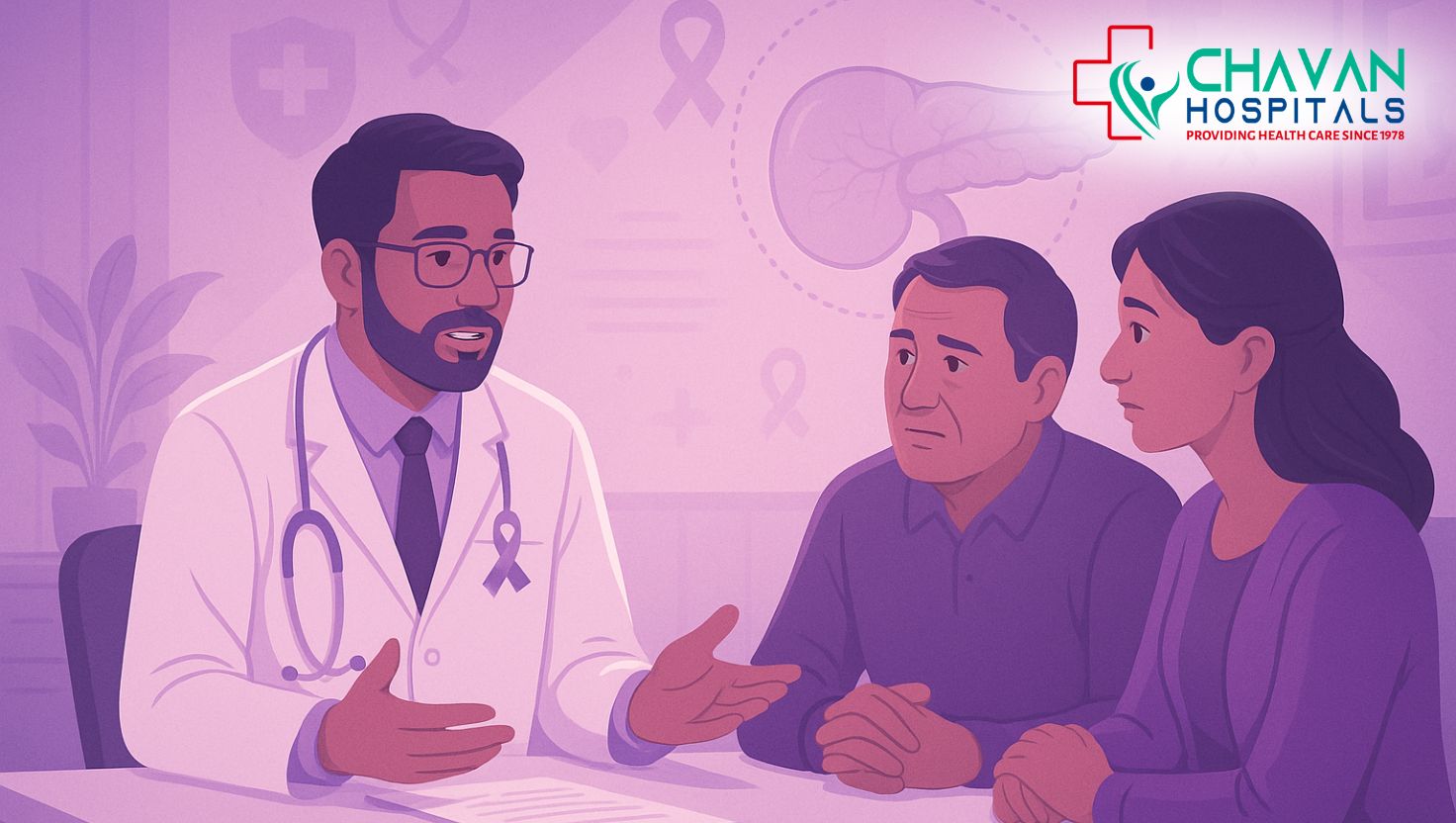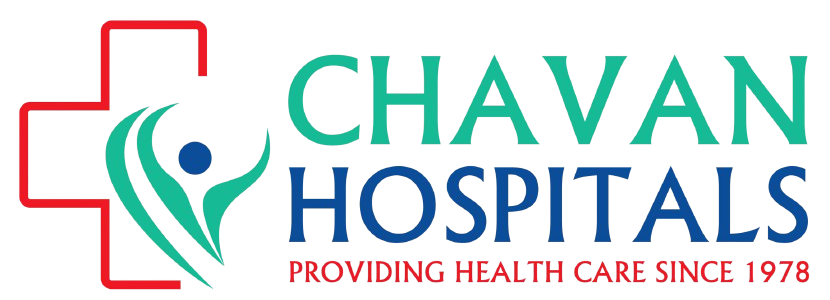- Home
- About us
- Specialities
Superspeciality
- Doctors
- Resources
- Contact us
Pancreatic Cancer: Causes, Symptoms, Diagnosis & Treatment
Because it progresses silently, pancreatic cancer is one of the most aggressive types of cancer and is frequently discovered in advanced stages. We at Chavan Hospitals, the top oncology hospital in Balapur, Hyderabad, and a top healthcare provider, are dedicated to providing patients with pancreatic cancer with compassionate care, cutting-edge therapies, and early detection.


What is Pancreatic Cancer?
The tissues of the pancreas, a vital organ situated behind the bottom portion of the stomach, are where pancreatic cancer starts. Through the production of hormones and enzymes, including insulin, the pancreas plays a vital role in blood sugar management and digestion. Usually, pancreatic cancer develops when the organ’s cells begin to proliferate out of control and develop into a tumor. Unfortunately, because there aren’t many signs in the early stages, this kind of cancer is sometimes discovered too late.
Types of Pancreatic Cancer
Pancreatic cancer is classified into two main types:
The most prevalent type of tumors are exocrine ones, which originate in the exocrine cells that make digestive enzymes. Adenocarcinoma of the pancreas is the most common kind.
Neuroendocrine tumors (NETs): These develop in the pancreatic cells that produce hormones. NETs are less frequent than exocrine tumors, but they typically grow more slowly.
Staging of Pancreatic Cancer
Understanding the stage of pancreatic cancer is crucial for determining the treatment plan. The stages include:
- Stage 0: Abnormal cells in the pancreatic ducts that may become cancer.
- Stage I: Cancer confined to the pancreas.
- Stage II: Cancer may have spread to nearby tissues or lymph nodes.
- Stage III: Cancer has spread to major blood vessels or lymph nodes.
- Stage IV: Cancer has spread to distant organs like the liver or lungs.
At Chavan Hospitals, Hyderabad, we utilize advanced diagnostic tools to accurately stage pancreatic cancer and provide a customized treatment plan.
What Causes Pancreatic Cancer?
While the exact cause remains unclear, certain risk factors are known to increase the likelihood of developing pancreatic cancer:
- Smoking: Smokers are twice as likely to develop pancreatic cancer.
- Chronic Pancreatitis: Long-term inflammation of the pancreas.
- Diabetes: Especially type 2 diabetes.
- Obesity: Being overweight significantly increases the risk.
- Family History: A strong genetic component is associated with pancreatic cancer.
- Age: Most patients are over 60 years old.
- Diet: High-fat, low-fiber diets can contribute to risk.
Symptoms of Pancreatic Cancer
Pancreatic cancer often goes unnoticed until it has advanced. Symptoms may include:
- Upper abdominal or back pain
- Unexplained weight loss
- Loss of appetite
- Yellowing of the skin and eyes (jaundice)
- Fatigue
- Dark-colored urine
- Pale or greasy stools
- Blood clots
- New-onset diabetes
If you’re experiencing any of these symptoms, early consultation at Chavan Hospitals, the best cancer hospital in Balapur, Hyderabad, can make a significant difference.
Pancreatic Cancer Diagnosed at Chavan Hospitals
At Chavan Hospitals, our multidisciplinary team of some of the best oncologists in Hyderabad leverages cutting-edge diagnostic technologies to detect and stage pancreatic cancer. Our diagnostic tools include:
- Imaging tests: CT scans, MRI, endoscopic ultrasound (EUS), and PET scans.
- Blood tests: CA19-9 tumor marker levels.
- Biopsy: Tissue samples analyzed to confirm cancer type.
- Genetic testing: Identifies mutations that may influence treatment.
Early and accurate diagnosis is key, and our cancer specialists at Chavan ensure a streamlined diagnostic journey from consultation to confirmation.
Treatment Options at Chavan Hospitals
As the best oncology hospital in Balapur, Hyderabad, Chavan Hospitals offers a full range of personalized treatment options tailored to the stage and type of pancreatic cancer:
1. Surgery
In early-stage cases, the best chance of recovery is by surgical removal of the tumor. Typical surgical choices include: The Pancreaticoduodenectomy, or Whipple Procedure: eliminates the duodenum, a portion of the stomach, the head of the pancreatic, and other surrounding organs.
A distal pancreatectomy involves removing the pancreas’s body and tail. In certain situations, a total pancreatectomy involves removing the entire organ.
2. Chemotherapy
Chemotherapy uses drugs to kill cancer cells or stop their growth. It can be administered before surgery (neoadjuvant) or after surgery (adjuvant), or as a primary treatment in advanced cases.
3. Radiation Therapy
Radiation therapy uses high-energy rays to destroy cancer cells. It is often used in combination with chemotherapy for better results.
4. Targeted Therapy & Immunotherapy
Some patients benefit from targeted therapies that attack specific genetic mutations or immunotherapy that boosts the body’s own immune system to fight cancer.
5. Palliative Care
For patients with advanced pancreatic cancer, our expert team offers palliative care to manage symptoms and improve quality of life through:
- Pain management
- Nutritional support
- Psychological counseling
Lifestyle Tips
While treatment plays a major role, healthy lifestyle choices can support better outcomes:
- Quit smoking and avoid alcohol
- Follow a low-fat, high-fiber diet
- Stay physically active
- Maintain a healthy weight
- Get regular check-ups, especially if you have a family history of cancer
FAQ's
Is pancreatic cancer curable?
Pancreatic cancer is difficult to cure due to late diagnosis, but when detected early, especially at Stage I, surgical removal can offer a chance for a cure. At Chavan Hospitals, we provide comprehensive care from early detection to advanced treatments.
How can I reduce my risk of pancreatic cancer?
Avoid smoking, maintain a healthy weight, eat a nutritious diet, and control chronic conditions like diabetes. Regular screenings can help if you have a family history.
Who is most at risk for pancreatic cancer?
Those over 60, smokers, people with chronic pancreatitis or diabetes, and those with a family history are at higher risk.
Is pancreatic cancer painful?
In advanced stages, pancreatic cancer may cause significant pain, especially in the back. Our pain management team ensures comfort at every stage.
Can pancreatic cancer be detected early?
It’s challenging to detect early due to lack of symptoms. However, people with a genetic predisposition can benefit from surveillance at centers like Chavan Hospitals.
What is Whipple surgery?
A complex surgical procedure that removes part of the pancreas, duodenum, and other structures. It offers the best chance of survival for tumors in the head of the pancreas.
Can pancreatic cancer come back after treatment?
Yes, recurrence is possible. That’s why long-term monitoring and follow-up care are essential, which we provide at Chavan Hospitals.
Does pancreatic cancer run in families?
Yes, 5-10% of cases have a hereditary link. Genetic testing and counseling are available at our center for high-risk individuals.
Why Choose Chavan Hospital
Chavan Hospitals stands as a beacon of hope for those fighting pancreatic cancer. As the best cancer hospital in Balapur, Hyderabad, our state-of-the-art facilities, team of the best oncologists in Hyderabad, and patient-first approach ensure you receive the highest standard of cancer care.
Take the first step toward hope and healing. Schedule a consultation at Chavan Hospitals and let us walk this journey with you..
